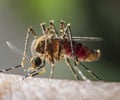A man in the US has become the world's first to sexually transmit an insect-borne disease to his wife.

When Foy returned to the U.S. and had sex with his wife, he unknowingly transmitted the disease to her.
Foy, who co-authored the study with his wife, initially wrote about three anonymous patients.
He later revealed in an interview with Science Now that he is patient No. 1; his colleague, Kevin Kobylinski, a Ph.D student who accompanied Foy on the trip, is patient No. 2; and Foy’s wife, Joy Chilson Foy, is patient No. 3.
Foy and Kobylinski returned from Senegal in August 2008 after collecting mosquitoes as part of their research.
Five days later, they both developed rashes on their torsos, fatigue, headaches, and swollen, painful wrists, knees and ankles. Foy said he also had an inflamed prostate, painful urination and blood in his semen.
By early September, Chilson Foy became ill - she also had a headache with hypersensitivity to light, muscle pains and chills. The Foy’s children did not get sick.
The couple said they started to feel better within a week, except for the joint pains.
The Foys took their case to the Centers for Disease Control and Prevention lab for insect-borne diseases in Fort Collins, Colo., and the scientists there were just as stumped.
Foy and Kobylinski both tested positive for dengue fever, but Chilson Foy did not. But, a medical entomologist at the University of Texas Medical Brach at Galveston, Andrew Haddow, had another theory - the Zika virus.
Since Foy had kept serum samples frozen, he had a colleague of Haddow’s run tests and sure enough, the samples came back positive for Zika.
According to Foy’s study, the circumstantial evidence for Chilson Foy’s sexual transmission is strong.
"Patients 1 and 3 reported having vaginal sexual intercourse in the days after patient 1 returned home but before the onset of his clinical illness," Fox News quoted him as writing.
Foy said there are hints in other literature that sexually transmitted mosquito-borne viruses are possible.
Boars who were infected with Japanese encephalitis shed the virus in their semen, and when female pigs were artificially inseminated with the boars’ semen they also became infected.
Haddow said most cases of the Zika virus are mistaken for dengue fever, which is mostly found in parts of Africa and Southeast Asia.
The study has been published in Emerging Infectious Diseases.
Source-ANI









